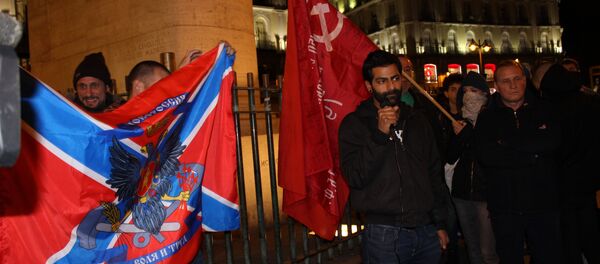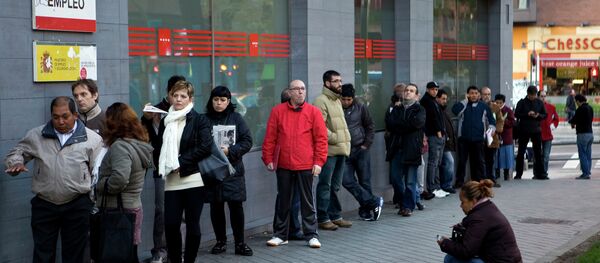The initial article in the Spanish daily El Pais mentioned only that the eight had fought in a “pro-Russian gang.” To the authors, this must have seemed a big enough reason to say that the eight young people (from 20 to 30 years of age, at least three former military among them) were justly accused of “participation in murder,” “illegal possession of arms and explosives” and even “acting against the interests of Spain abroad.” The last accusation looks more political than legal (one cannot find an article penalizing damage to your motherland’s foreign endeavors in any civilized country, including Spain), but who can be surprised by such things in our times?
Otherwise, fighting for “anti-Assad gangs” (against the Syrian government) or for the virulently racist Kosovo Liberation Army, or KLA (against the former Yugoslavia’s government) would have brought the same consequences as fighting for a “pro-Russian gang” in Donbass. The consequences are very different, however, and that needs to be pointed out. A classical story of double standards.
Well, the actions of the pro-Western fighters (such as the KLA or the anti-Assad Free Syrian Army) could be much more cruel and lethal for civilians than what the eight Spanish “interbrigadistas” did countering the Ukrainian regime’s attacks against Donbass. But fighting against the West’s darlings is seen as illegal and immoral (hence the accusations in Spain), while fighting FOR KLA or the Free Syrian Army is seen as legal or, at least, moral.
“Any kind of European support for the breakaway republics in eastern Ukraine is an embarrassment to Washington,” comments Paul Craig Roberts, a former official in president Reagan’s administration and currently the head of the US-based Institute for Political Economy. “DNR and LNR refused to recognize the new regime in Kiev, which has total backing of the US. And countries of the European Union, such a Spain, are very dependent on the United States. So, it would be naïve to expect from them equal treatment for people fighting on pro-US and anti-US in various conflicts.”
In 2012, El Pais published a long article about two Spanish citizens, both Muslims from the city of Ceuta, who went to fight against President Assad in Syria. One, Rashid Wahbi, was shot dead by the Syrian government forces. The other was named Mustafa Mohammed Layachi, he was Wahbi’s friend and companion in what El Pais said was a “jihadist operation.” Mustafa was wounded and needed treatment at home, but the Spanish authorities did not make any effort to arrest him for participating in a “jihad” against a foreign country. As well, El Pais lionized the dead Rashid Wahbi and his adoring widow, who promised to raise her children in the same spirit that led her husband to Syria.
Why was El Pais so hostile to the two arrested Spanish participants in the war in Donbass (only two were initially mentioned by name — Rafael Muñoz Pérez, 27, and Ángel Davilla-Rivas, 22) and so nice to the anti-Assad jihadists? Could the reason be the two young men’s ironic attitude to the Western media and its coverage of the war in Donbass?
“My visit allowed me to see the real life here and to note the difference between the reality and the fake and manipulative picture of it which the huge majority of the Western media present to us,” Rafael Muñoz Pérez said from Donetsk last summer in an interview to the French television station France 24.
The interview was quickly republished in many Spanish social media outlets, including the Facebook pages of several Committees of Solidarity With Anti-Fascist Ukraine (there are ones in Zaragoza, the Asturias and several other Spanish regions). All of these networks are now protesting the activists’ arrests.
However, the young and isealistic Rafael and Angel, who were both arrested by Spain’s special police forces at 6:30 in the morning on Friday, do not fit the image of the cold-blooded “mercenaries,” whom the Ukrainian government claims them to be. The young men put their videos from Donbass into the social networks themselves, there are no images that would allow to accuse them of mistreating the local population or, in fact, fighting the Ukrainian armed forces. Rafael, Angel and almost all of the other six arrested people are activists of the left-leaning, but peaceful Spanish organizations. In their interviews, all claim to be fighting for the same ideals which the Spanish leftists defended in their civil war against general Franco’s rebellion in 1936-1939.
“We need to spread the truth, so that the world would stop looking away from Donbass, in the same way it looked away from my country Spain in 1936,” Rafael Munoz said in one of his interviews before his arrest. “Police sources report there are other groups of Spanish young people, also of a pro-Russian and leftist mindsets, which are bracing up for a trip to Ukraine,” El Pais reports.
Nothing surprising about this in a country, where the first “international brigades” actually appeared in 1936 – with Russians participating.




